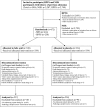A randomized trial on folic acid supplementation and risk of recurrent colorectal adenoma
- PMID: 19864409
- PMCID: PMC2777472
- DOI: 10.3945/ajcn.2009.28319
A randomized trial on folic acid supplementation and risk of recurrent colorectal adenoma
Abstract
Background: Evidence from observational studies suggests that inadequate folate status enhances colorectal carcinogenesis, but results from some randomized trials do not support this hypothesis.
Objective: To assess the effect of folic acid supplementation on recurrent colorectal adenoma, we conducted a cost-efficient, double-blind, randomized trial among participants of 2 large prospective cohorts, the Health Professionals Follow-Up Study and the Nurses' Health Study.
Design: Participants were randomly assigned to receive folic acid (1 mg/d) (n = 338) or placebo (n = 334) for 3-6.5 y. The primary endpoint was any new diagnosis of adenoma during the study period (May 1996-March 2004). Secondary outcomes were adenoma by site and stage and number of recurrent adenomas. Associations were also examined by plasma folate concentrations at baseline.
Results: Incidence of at least one recurrent adenoma was not significantly associated with folic acid supplementation [relative risk (RR): 0.82; 95% CI: 0.59,1.13; P = 0.22]. Among participants with low plasma folate concentrations at baseline (<or=7.5 ng/mL), those randomly assigned to receive folic acid experienced a significant decrease in adenoma recurrence (RR: 0.61; 95% CI: 0.42, 0.90; P = 0.01), whereas for subjects with high folate concentrations at baseline (>7.5 ng/mL), supplemental folic acid had no significant effect (RR: 1.28; 95% CI: 0.82, 1.99; P = 0.27, P(interaction) = 0.01). Contrary to findings from another clinical trial, there was no evidence for an increased risk of advanced or multiple adenomas.
Conclusions: Our results do not support an overall protective effect of folic acid supplementation on adenoma recurrence. Folic acid supplementation may be beneficial among those with lower folate concentrations at baseline. This trial was registered at clinical trials.gov as NCT00512850.
Figures
References
-
- Giovannucci E. Epidemiologic studies of folate and colorectal neoplasia: a review. J Nutr 2002;132:2350S–5S - PubMed
-
- Kim YI. Folate, colorectal carcinogenesis, and DNA methylation: lessons from animal studies. Environ Mol Mutagen 2004;44:10–25 - PubMed
-
- Paspatis GA, Karamanolis DG. Folate supplementation and adenomatous colonic polyps. Dis Colon Rectum 1994;37:1340–1 - PubMed
-
- Cole BF, Baron JA, Sandler RS, et al. Folic acid for the prevention of colorectal adenomas: a randomized clinical trial. JAMA 2007;297:2351–9 - PubMed
Publication types
MeSH terms
Substances
Associated data
Grants and funding
LinkOut - more resources
Full Text Sources
Medical


